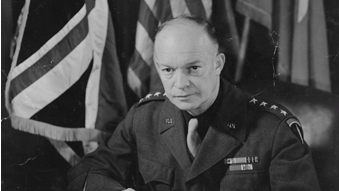When an American U-2 spy plane was shot down over Russia in May 1960, American Congressmen leaped to the defense of the President and cursed Nikita Khrushchev. These well-intended men were talking about something they did not know about.
Before the U-2 incident, William Knowland, Republican leader of the Senate, had made President Eisenhower’s life miserable by pushing his own hard-shell foreign policy from the Senate floor. When an American plane was shot down in the Far East, Knowland demanded that the President break diplomatic relations with the Soviets. He accused Eisenhower of doing “nothing more than merely sending notes to Moscow.”
Privately, the President feared that when they learned that the downed plane was on an espionage mission, they would feel foolish and turn on him.
On October 4, 1957, the Soviets launched the first man-made satellite – Sputnik. For six years, political opponents had looked for Eisenhower’s Achille’s heel. Now they had found it and they charged Ike with complacency.
“It is not very reassuring to be told that next year we will put a better satellite in the air,” cajoled Lyndon Johnson. “Perhaps it will even have chrome trim – and automatic windshield washers.” General Curtis LeMay, General Twining and some congressmen warned of a Russian build-up of bombers.
On November 25, the President suffered a stroke. Nixon and Dulles told each other that the criticism may have been the cause.
December was no better. At Cape Canaveral, a rocket – intended to be the American answer to Soviet space accomplishments – exploded on the launch pad. The Washington Post leaked the finding of the Gaither Report. It claimed America was vulnerable to Soviet attack. The American people were alarmed and the clamor grew.
The President had already shelved many of the report’s recommendations on the grounds that they lacked “certain vital information.” The sleek, blank phantom of the ether, the U-2 spy plane, had already documented the failures of the Soviet programs.

Recent Comments